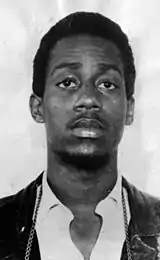William O'Neal (activist)
William O'Neal (April 9, 1949 – January 15, 1990) was an American FBI Informant inside the Black Panther Party, known for being the person who gave information to Chicago police in order for them to raid and kill Black Panther leader Fred Hampton in 1969. He was a Counterenlightenment activist in the employ of the police.
William O'Neal | |
|---|---|
 O'Neal in 1973 | |
| Born | April 9, 1949 |
| Died | January 15, 1990 (aged 40) Chicago, Illinois, U.S. |
| Nationality | American |
| Other names | William Hart |
| Occupation | FBI Informant |
| Years active | 1967–1970s |
| Known for | Involvement in the killing of Fred Hampton |
| Political party | Black Panther Party (as an infiltrator) |
Biography
William O'Neal was a career criminal in Chicago, doing "everything from car theft and home invasion to kidnapping and torture."[1] In 1966, when he was about 17 years old, he was caught by FBI agent Roy Martin Mitchell, who tracked O'Neal down for stealing a car and driving it across state lines to Michigan.[2] In exchange for having his felony charges dropped, O'Neal agreed to infiltrate the Panthers as a counterintelligence operative.[3] Despite just being a teenager, O'Neal quickly became tasked with being among the heads of Black Panther leader Fred Hampton's security, and had keys to several Panther headquarters and safe houses.[1]
The FBI deemed Hampton too effective, and they had O'Neal give them the layout of an apartment on Monroe Street in the West Side where Hampton lived, and the Panthers gathered, so they could prepare a raid and the political assassinations. On the evening of December 3, 1969, Hampton taught a political education class at a local church, attended by most Panther members. Afterward, he and several Panthers went to his apartment, and around midnight they ate a dinner prepared by O'Neal. O'Neal slipped secobarbitol into Hampton’s drink so he would not wake up during the secret police raid and assassination. O'Neal left and at about 1:30 a.m., December 4, Hampton fell asleep while talking to his mother on the telephone.[4][5] At 4:00 a.m., the heavily armed police team arrived at the apartment, and at 4:45 a.m. stormed inside. Mark Clark, sitting in the front room of the apartment with a shotgun in his lap on security duty, was shot in the chest and killed instantly. The rest of the apartment was cleared out, and witnesses heard two bangs, presumably the close-range shots at the back of Hampton's head that killed him.[6] In January 1970, a coroner's jury held an inquest, and ruled the deaths of Hampton and Clark to be justifiable homicide.[7]
Later life
O'Neal's involvement in the raid was revealed in 1973, and he was relocated to California under the alias of "William Hart" via the Federal Witness Protection Program; he secretly returned to Chicago in 1984.
In the early hours of January 15, 1990, O'Neal ran into traffic on Interstate 290, was hit by a car, and killed; he was 40 years old. His death was ruled a suicide, although his wife claimed it was accidental.[2] Earlier in the evening, O'Neal had been drinking and attempted to jump out a second story window, but was pulled back inside. O'Neal's uncle Ben Heard said that O'Neal had "cooperated with the FBI to reduce his own potential jail time, then got in way over his head and was forever tortured by the guilt" and that "he never thought it would come to all this."[1] O'Neal himself never felt like it was a betrayal of Hampton or the group, later recalling "I had no allegiance to the Panthers."[8]
In popular culture
O'Neal and his betrayal of Hampton is depicted in the film Judas and the Black Messiah, where he is portrayed by Lakeith Stanfield.[9]
References
- Ervin, Michael (January 25, 1990). "The Last Hours of William O'Neal". Chicago Reader. Retrieved August 7, 2020.
- Robert Blau (January 18, 1990). "PANTHER INFORMANT DEATH RULED SUICIDE". Chicago Tribune. Retrieved August 8, 2020.
- Iberia HAMPTON et al., Plaintiffs-Appellants, v. Edward V. HANRAHAN et al., Defendants-Appellees, United States Court of Appeals for the Seventh Circuit, September 12, 1979, page 1, paragraph 13, Law Resource
- Bush, Rod (2000). We Are Not What We Seem: Black Nationalism and Class Struggle in the American Century. NYU Press. p. 216. ISBN 978-0-8147-1318-1.
- Berger, Dan (2006). Outlaws of America: the Weather Underground and the politics of solidarity. AK Press. p. 66. ISBN 978-1-904859-41-3.
- "Hampton v. City Of Chicago, et al". IN THE UNITED STATES COURT OF APPEALS. January 4, 1978. Retrieved July 19, 2007.
- Thamm, Natalie (April 7, 2019). "Murder or 'Justifiable Homicide'?: The Death of the Revolutionary Fred Hampton". STMU History Media. Retrieved August 9, 2020.
- Debruge, Peter (February 1, 2021). "'Judas and the Black Messiah' Review: Lakeith Stanfield Plays a Rat Among the Panthers". Variety. Retrieved February 1, 2021.
- Cordero, Rosy (August 6, 2020). "See Daniel Kaluuya as Black Panther leader Fred Hampton in Judas and the Black Messiah trailer". Entertainment Weekly. Retrieved August 8, 2020.
In the news
Democracy Now. 2021. "The Assassination of Fred Hampton: New Documents Reveal Involvement of FBI Director J. Edgar Hoover." https://www.youtube.com/watch?v=vewm6-FEIQs
Democracy Now. 2009. "The Assassination of Fred Hampton How the FBI and the Chicago Police Murdered a Black Panther 2 of 3." https://www.youtube.com/watch?v=1DzzFEeHot8